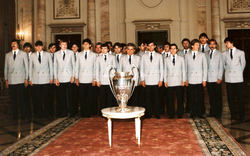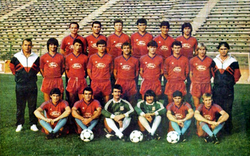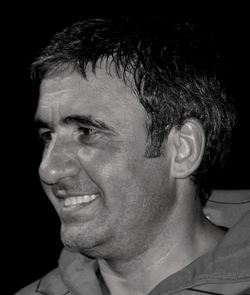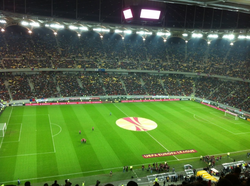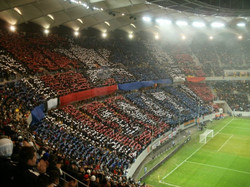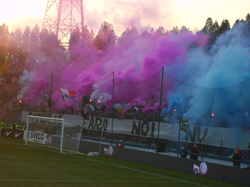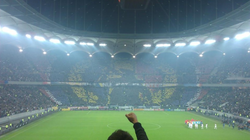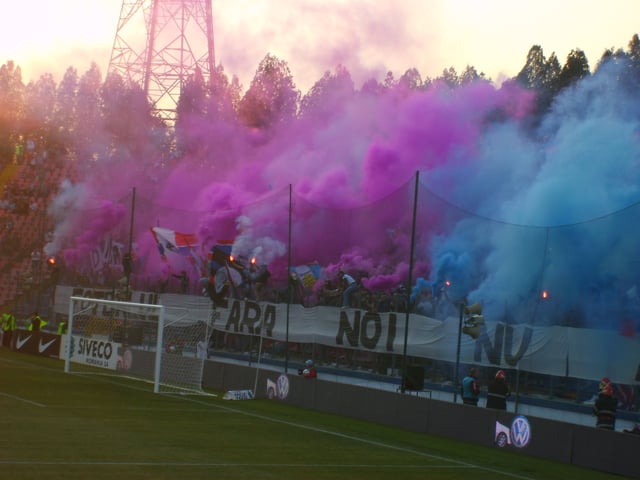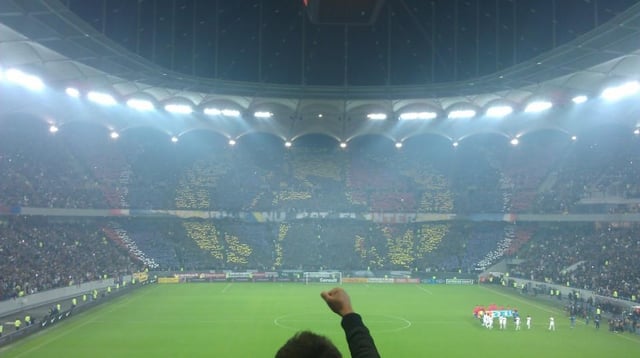FC Steaua București
FC Steaua București
| Full name | Fotbal Club FCSB[70] |
|---|---|
| Nickname(s) |
|
| Short name | FCSB |
| Founded | 7 June 1947; 70 years ago(1947-06-07)asASA București |
| Ground | Arena Națională |
| GroundCapacity | 55,634[90] |
| Owner | George Becali |
| Chairman | Valeriu Argăseală |
| Manager | Bogdan Andone |
| League | Liga I |
| 2018–2019 | Liga I, 2nd |
| Website | https://www.steauafc.com/en/ |
FCSB ( Romanian pronunciation: [fet͡ʃeseˌbe] ), short for Fotbal Club Steaua București ( Romanian pronunciation: [ˈste̯awa bukuˈreʃtʲ] ) and colloquially known as simply Steaua, is a Romanian professional football club based in Bucharest. Founded in 1947 as Asociația Sportivă a Armatei București, it has spent its entire history in the Liga I, the top tier of the Romanian football league system.
The team was previously part of the CSA Steaua București sports club and belonged to the Romanian Army, however it separated in 1998. The Army sued the football club in 2011 and has since been in a conflict regarding the ownership of the Steaua brand, which resulted in the change of the name to the acronym FCSB in early 2017. Domestically, Roș-albaștrii have won Liga I 26 times, Cupa României 22 times, Cupa Ligii 2 times and Supercupa României 6 times – all competition records. Internationally, they have won the European Cup and European Super Cup, both in 1986. They reached the European Cup final once again in 1989, when they were defeated by Milan. Throughout its history, Steaua also played the final of the Intercontinental Cup, the quarter-finals of the European Cup Winners' Cup and the semi-finals of the UEFA Cup.
Their home ground is Arena Națională, having moved here from the Ministry of National Defence-owned Stadionul Ghencea. Initially, the club played in the colours of the Romanian tricolour – blue, yellow and red – but yellow soon lost its importance and the team became associated with the red and blue colours. Recently, some away kits have begun to reintegrate the yellow colour.
The club has a long-standing rivalry with neighbouring Dinamo București, with matches between the two being commonly referred to as "the Eternal Derby" or "the Romanian Derby".
| Full name | Fotbal Club FCSB[70] |
|---|---|
| Nickname(s) |
|
| Short name | FCSB |
| Founded | 7 June 1947; 70 years ago(1947-06-07)asASA București |
| Ground | Arena Națională |
| GroundCapacity | 55,634[90] |
| Owner | George Becali |
| Chairman | Valeriu Argăseală |
| Manager | Bogdan Andone |
| League | Liga I |
| 2018–2019 | Liga I, 2nd |
| Website | https://www.steauafc.com/en/ |
History
Steaua was founded on 7 June 1947 at the initiative of several officers of the Romanian Royal House.
The establishment took place following a decree signed by General Mihail Lascăr, High Commander of the Romanian Royal Army. The club's first name was ASA București (Asociația Sportivă a Armatei București – Army Sports Association). It was formed as a sports society with seven initial sections, including football, coached by Coloman Braun-Bogdan. ASA was renamed CSCA (Clubul Sportiv Central al Armatei – Central Sports Club of the Army) in 1948 and CCA (Casa Centrală a Armatei – Central House of the Army) in 1950.
In 1949, CSCA won its first trophy, the Cupa României, defeating CSU Cluj 2–1 in the final. Under the name of CCA, the club managed to win three Championship titles in a row in 1951, 1952 and 1953, along with its first Championship–Cup double in 1951. During the 1950s, the so-called CCA Golden Team became nationally famous. In 1956, the Romania national team (composed exclusively of CCA players) played Yugoslavia in Belgrade and won 1–0. In the same year, CCA, coached by Ilie Savu, became the first Romanian team to participate in a tournament in England, where it achieved noteworthy results against the likes of Luton Town, Arsenal, Sheffield Wednesday and Wolverhampton Wanderers. [92]
At the end of 1961, CCA changed its name once again to CSA Steaua București (Clubul Sportiv al Armatei Steaua – Army Sports Club Steaua). The club's new name translated to The Star and was adopted because of the presence of a red star, a symbol of most East European Army clubs, on its crest. A poor period of almost two decades followed in which the club claimed only three championships (1967–68, 1975–76, 1977–78). Instead, the team won nine national cup trophies, for which matter it gained the nickname of "cup specialists". [5] Also during this period, on 9 April 1974 Steaua's current ground, Stadionul Ghencea, was inaugurated with a friendly match against OFK Beograd. [6]
Under the leadership of coaches Emerich Jenei and Anghel Iordănescu, Steaua had an impressive Championship run in the 1984–85 season, which it won after a six-year break. Subsequently, Steaua became the first Romanian club to reach a European Cup final, which it ultimately won against Barcelona on penalties (2–0 thanks to goalkeeper Helmuth Duckadam saving all four penalties taken by the Spaniards), after a goalless draw. Steaua therefore became the first Eastern European team to claim the title of European champions. An additional European Super Cup was won in 1987 against Dynamo Kyiv. Steaua remained at the top of European football for the rest of the decade, managing one more European Cup semi-final in 1987–88 and one more European Cup final in 1989 (lost 4–0 to Milan ). Notably, this was in addition to its four additional national titles (1985–86, 1986–87, 1987–88, 1988–89) and four national cups (1984–85, 1986–87, 1987–88, 1988–89). Furthermore, from June 1986 to September 1989, Steaua ran a record 104-match undefeated streak in the championship, setting a world record for that time and a European one still standing. [10]
The Romanian Revolution led the country towards a free open market and, subsequently, several players of the 1980s team left for other clubs in the West. After a short pull-back, a quick recovery followed and Steaua managed a six consecutive championship streak between 1992–93 and 1997–98 to equalize the 1920s performance of Chinezul Timișoara [14] and also three more cups in 1995–96, 1996–97 and 1998–99. At international level, the club also managed to reach the UEFA Champions League group stage three years in a row between 1994–95 and 1996–97. In 1998, the football club separated from CSA Steaua and changed its name to the current FC Steaua București (Fotbal Club Steaua – Football Club Steaua), [16] being led by Romanian businessman Viorel Păunescu. Păunescu performed poorly as a president and soon the club was plunged into debt. [18] George Becali, another businessman, was offered the position of vice-president in the hope that Becali would invest money in the club. Becali eventually purchased the majority share in 2002 and turned the governing company public in January 2003. [21]
Because of his controversial character, he has been challenged by the majority of Steaua fans.
[22] [75] [85] [97] The team qualified for the UEFA Cup group stage in the 2004–05 season and became the first Romanian team to make it to the European football spring since 1993 (also Steaua's performance). The next season, Steaua reached the UEFA Cup semi-finals in 2005–06, where it was eliminated by Middlesbrough thanks to a last-minute goal. Steaua thereafter qualified for the following Champions League seasons after a ten-year break, and in 2007–08 Steaua again reached the group stage of the Champions League. Nationally, the club won two titles – in 2004–05 and 2005–06 – and the Supercupa României in 2006, the latter being the club's 50th trophy in its 59-year history. [90]
In 2013, Steaua won its 24th national title, also reaching the UEFA Champions League group stage for 2013–14. It repeated the same performance next year, in 2014, winning its 25th championship.
After the Ministry of National Defense sued FC Steaua București in 2011, [58] claiming that the Romanian Army were the rightful owners of the Steaua logo, colours, honours and name, the Executive Committee of the Romanian Football Federation approved an application to modify the name of the club from "SC Fotbal Club Steaua București SA" to "SC Fotbal Club FCSB SA" on 30 March 2017, [70] [90] following more judiciary sentences. CSA Steaua București had previously announced they would refound their football department in the summer of the same year. [90] However, owner Becali announced that his team would retain the original honours and UEFA coefficient, and was also hopeful of recovering the name in the near future. [31]
Crest and colours
ASA București was founded by the Royal Army on 7 June 1947, at which date the club had no official crest.
During its first season, 1947–48, Steaua wore yellow and red striped shirts with blue shorts, to symbolize Romania's tricolour flag.
[90] Starting with the following season and with the Army's change of identity from the Royal Army to the People's Army, the yellow was gradually given up, so that the official colours remained, up to this day, the red and the blue.
As communists assumed total control of the country on 30 December 1947, [90] the Royal Army was transformed into the People's Army and ASA automatically with it.
Being inspired by the Red Army, the new Ministry of Defence decided to create a crest for the club, along with the change of name to CSCA, consisting in an A-labeled red star (symbol of the Red Army) on a blue disc.
Two years later, the change of name to CCA brought with it a new crest consisting of the same red star labeled CCA surrounded by a crown of laurel.
The all-present star motif on the crest finally had its saying over the new name of Steaua as up 1961.
It was opted for a badge which, redesigned, remains up to this day the club's symbol: the red and blue striped background with a golden star in the middle, to symbolize to Romanian tricolour flag.
The shape for the emblem was redesigned in 1974, once the team moved to Stadionul Ghencea.
Following the Romanian Revolution, the Army decided to break all links to the defunct communist regime, so, in 1991, CSA Steaua had a last change of crest with an eagle also present on the Ministry of Defence coat of arms and also on Romania's. As FC Steaua appeared in 1998, the club added two yellow stars on top of the CSA Steaua badge signifying its 20 titles of champions won, along with the Fotbal Club specification.
In 2003, the new Board of Administration run by George Becali decided to change the crest, which was a return to the old emblem of 1974–1991, redesigned with the two yellow stars on top.
Steaua has never had a standard playing kit.
However, the most widely used throughout time was the combination of red shirts, blue shorts and red socks.
Other variants have been all-red, all-blue and also shirts in vertical red and blue stripes during the 1960s and 1970s.
Other kit colours have very rarely been used.
Exceptions were the 1986 European Cup Final in which Steaua wore, for the only time in their history, an all-white kit, the 1999–00 away kit (yellow and red), the 2005–06 third kit (yellow and black), the 2008–12 and 2014–16 away kit (all-yellow), the 2012–14 away kit ( all-sky blue or sky blue shirts with dark blue shorts and socks). For the 2016–17 season, the away kit is all-white.
The Ministry of National Defense sued Steaua in 2014, claiming that the Romanian Army were the rightful owners of the Steaua logo. The Supreme Court found in the army's favour, and on 3 December 2014 stripped the football club of its badge. Steaua were forced to play their next home game, against CSM Studențesc Iași, without it on the stadium scoreboard. The club unveiled a new badge in January 2015, an eight-sided star containing the letters FCSB, [90] and issued a statement to the effect that they had reached an agreement with the Ministry of National Defense that would allow them to retain the name Steaua București and the colours. [96]
Kit manufacturers and shirt sponsors
Steaua's kit is currently manufactured by Nike, who have held the contract since 2002, after a long partnership with Adidas. [96] First team shirt sponsors have been City Insurance since 2013. [96] Previous sponsors include Ford, [96] Castrol, Philips, CBS, Bancorex (initially BRCE), Dialog (currently Orange), BCR, RAFO and CitiFinancial. [96]
Stadium
Steaua played the first three matches in its history at the defunct Venus stadium. Opened in 1931, the venue had previously been in the property of Venus București, a club disbanded in 1949. [96] After that ground's demolition through order of the Communist regime, Steaua played its home matches at any one of Bucharest's three largest multi-use stadia: ANEF, Republicii (built in 1926 and demolished in 1984 to make room for the erection of the Casa Poporului) and 23 August (built in 1953). Of these two, 23 August (later renamed Național) was mostly used when two matches between Bucharest clubs were scheduled in the same matchday or for important European matches, while Republicii for regular matches in the championship.
From 1974 to 2015, Steaua played its home matches at the Stadionul Ghencea, a football stadium situated in South-Western Bucharest. Part of Complexul Sportiv Steaua, it was inaugurated on 9 April 1974 when Steaua played a friendly match against OFK Beograd, [6] at which time it was the first football-only stadium ever built in Communist Romania, with no track & field facilities. The stadium was built through order of the Ministry of National Defence inside a former military base and was long used by CSA Steaua.
The original capacity was 30,000 on benches.
A general renovation occurred in 1991; this included installing seats, which dropped the capacity to 28,365.
[96] After a second renovation in 2006, [96] Ghencea was able to host UEFA Champions League events, being a 'Category 3' arena according to the UEFA classification system. [96]
The Romania national team was also a tenant for numerous fixtures. [96]
From 2011, Steaua played European games and its most important domestic games at the newly constructed Arena Națională, and from March 2015, played exclusively at the Arena Națională. In the 2016–17 domestic league season FCSB drew an average home attendance of 5,067, the best in the Romanian league. Their highest home attendance was 35,000 in that league season. [28] [38]
Support
Steaua has the largest number of supporters of any team in Romania.
A survey conducted in June 2007 suggested that the club accounts for approximately 42% of all Romanian football lovers, far greater than the teams ranked second and third, Dinamo București, with 12%, and Rapid București, with 9%. [80] The largest concentration of fans are in Bucharest, notably in areas adjacent to the arena, covering the whole southern half of Bucharest, a city geographically divided by the Dâmbovița River. [81] Also, the club has an important fan base inside the country, where several towns are renowned for counting vast majorities of Steaua supporters, and outside the borders, among Romanian emigrants.
The Steaua Ultras movement began in 1995, when the bases of Armata Ultra (AU), the first Ultras group from Bucharest (and second in Romania after Politehnica Timișoara's Commando Viola Ultra Curva Sud), [83] were set. The group quickly reached an impressive number of members, but, in 2001, they dissolved due to internal problems. Currently Steaua's supporters are divided into several groups, some of them being located at the Peluza Nord (North End) (Titan Boys, Nucleo, Insurgenții 1998, Skins 1996, Combat, Armata 47 Vest), while some other ones taking their place at the Peluza Sud (South End) (Vacarm, Glas, E.R.A., Hunters, Outlaws, Shadows, Roosters, T.K., Tinerii Sudisti). Several important groups such as Stil Ostil, Ultras, Banda Ultra' and South Boys retired from attending Steaua's matches due to the club's constant abuses towards them and, mainly, to the current ownership of Steaua. [86]
More recently, as of 2006, the supporters have formed their own official association, called AISS (Asociația Independentă a Suporterilor Steliști – Steaua Supporters' Independent Association).
AISS was formed as a legal entity with its stated goals of protecting the interests and image of Steaua supporters, as well as identifying and promoting the club's perennial values.
A heavy debated topic about the fans is the one related to racism. Stemmed from their rivalry with Rapid București, whose fans are often envisioned as Romani ethnics, [88] the issue degenerated on certain situations in several incidents between factions of supporters of Steaua and Rapid. [89] Also, the 2005–06 UEFA Champions League qualifying match against Shelbourne, resulted in a one-matchday pitch suspension for Steaua during the same European season, after racial chants were heard from the crowd. [91]
Lately, crowd turbulence has been one of the club's main problems.
During the last three seasons, 11 Liga I matchday suspensions and one in the UEFA Cup have been dictated against the Ghencea-based club out of reasons such as crowd trouble, racial chants or torch lighting.
In 2009, UEFA ordered Steaua to play two home games of the Europa League behind closed doors due to their fans displaying racist banners in a second qualifying round match against Hungarian side Újpest. Three further incidents occurred in the 2014–15 season, with the club fined and ordered to play further games in an empty stadium after displays of racist banners in matches against Dynamo Kyiv, Ludogorets Razgrad and Strømsgodset.
Steaua's Peluza Nord and Peluza Sud fan groups no longer support the current team, as a sign of protest.
They have instead started to attend the matches of CSA Steaua. However, an online poll conducted by Sport.ro in 2017 has shown that of the 120,000 voters, 95% consider FCSB to hold the real Steaua identity. [7]
A new fan group made up of a handful of individuals, Peluza Roș-Albastră, is trying its luck at filling the void left by the legendary Peluza Nord and Peluza Sud, with mixed results.
Rivalries
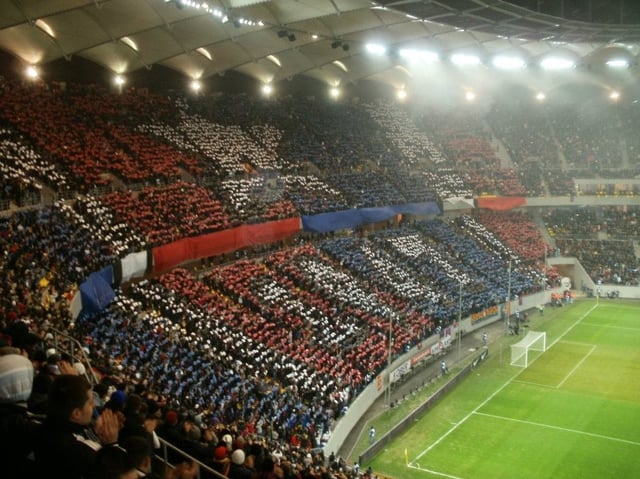
Choreography at the Peluza Nord in 2011
Steaua's most important rivalry is the one against Dinamo București. Marele Derby (The Great Derby) has been the leading Romanian football encounter in the last 60 years, as Steaua and Dinamo are the two most successful football teams in the country. There have been a total of 156 matches played so far between Steaua and Dinamo in the Romanian League, Romanian Cup and also Romanian Super Cup, with the following results: Steaua 55 wins, Dinamo 54 wins and 47 draws. [98] With 44 titles won altogether (Steaua–26; Dinamo–18), the two clubs have won 16 of the last 23 seasons. [14] It is also a match between the former clubs of the Romanian Army (Steaua) and the Ministry of Internal Affairs (Dinamo). Several clashes between different factions of supporters have often occurred and still occur inside and outside the stadium. The heyday was reached before a match kick-off in 1997, when Dinamo's fans set a sector of Stadionul Ghencea's Peluza Sud, where they were assigned, on fire. [4] On 16 August 2016, during Steaua's Champions League play-off 0–5 loss to Manchester City, undercover Dinamo fans displayed a huge message saying "Only Dinamo Bucharest", which was labelled one of the biggest pranks in football history. [19] Between October 1991 and April 2000, Steaua counted 19 undefeated official matches in front of their rivals, both in the championship and the cup. Just as well, a period of 17 years and 7 months has been recorded in which Dinamo did not manage to win away against Steaua in the domestic league. [9]
The second-most important rivalry is with Rapid București. Several matches in the last years between Steaua and Rapid have also ended in serious clashes between fans. [89] Rivalry has become even fiercer since Steaua outpassed Rapid in an all-Romanian quarter-final of the 2005–06 UEFA Cup. The local sports newspapers said that the two teams were linked up in this quarter-final by the line of the number 41 tram which links the Ghencea Stadium to the Valentin Stănescu Stadium.
Milder and historical rivalries are also with non-Bucharest-based teams, such as Universitatea Craiova, Politehnica Timișoara, Petrolul Ploiești, CFR Cluj, Universitatea Cluj and a recent one with Astra Giurgiu.
Ownership and finances
Steaua has always been known as the club of the Romanian Army, which founded it in 1947 as a sports society. The Army continues to own the society, called CSA Steaua București at the moment.
The football department, however, in order to comply with UEFA rules, separated and turned private in 1998, owned and financed by a non-profit organization called AFC Steaua București, chaired by businessman Viorel Păunescu. [16]
In January 2003, the club turned public under the leadership of investor and current politician George Becali, who had already purchased 51% of the society's shares and later on acquired the rest to become owner of the club. At present, Becali has no official link to the club, as he gradually renounced his shares. However, the facts that the current shareholders, that include several nephews of his, [17] are people loyal to him and that he is still in charge of Steaua are obvious. [20] An unofficial explanation for this situation is represented by the heavy amount of unpaid taxes added up by the former governing company, AFC Steaua București, whose payment towards the tax authority was avoided this way by transferring its assets to the new-formed company, with the old association going on liquidation bankruptcy. [23]
Popular culture
As Steaua is currently the most popular football team in Romania, [80] a good number of musicians or TV and film directors have inspired themselves from ideas linked to the Ghencea-based club.
Popular reference, however, appeared only after the Romanian Revolution, as before, mass-media programmes were mostly being controlled by the former communist regime.
The 2002 Romanian film Furia depicts scenes in which Steaua and Dinamo gangs of supporters are fighting on the streets after a direct match between the two sides.
[25] Prima TV comedy show Mondenii often airs sketches parodying Steaua owner George Becali, the players and other representatives around the club. [30] Pro TV series La bloc aired an episode in which characters Nelu and Costel are displayed as representing Steaua in a parking lot match against two other neighbours representing Dinamo.
Several other examples from music can be attributed as Steaua-related.
Apart from club anthems played throughout time by Marcel Pavel , Bere Gratis, Gaz pe Foc, an album was released in 2006 as a compilation by Mircea Vintilă, Chicanos, Bogdan Dima and several other artists. [33] Delikt and Ultras are two former hip hop bands whose members ranked the defunct Armata Ultra' brigade and would always show up displaying fan materials. Also, Voltaj, in their song 'MSD2', make reference to the fans in the line "Poți să fii câine sau poți fi stelist" ("You can be a dog or you can be a Steaua fan"). [35]
One of the most famous pop-culture references about the club is the association with Scooter's song Maria, first sung spontaneously in 2003 by the fans in Peluza Nord after the team would score. Ever since, it has been adopted as an unofficial club anthem and is being played at the stadium at every match, sung together by the supporters. Nonetheless, the song is beginning to lose popularity, mainly because it has become too commercial and many fans do not feel bonded with it any more. [37]
Honours
Note: As of November 2017, UEFA regards FCSB as the continuation of historic FC Steaua and attributes all honours since 1947 to this entity. [93] However, the ownership of the many trophies won between 1947 and 2003 is disputed, with the restarted football department of former parent club CSA Steaua also claiming them [32] following legal disputes between the two organisations. [44] [31] [60]
Domestic
Leagues
Liga I / Divizia A Winners (26) – Record: 1951, 1952, 1953, 1956, 1959–60, 1960–61, 1967–68, 1975–76, 1977–78, 1984–85, 1985–86, 1986–87, 1987–88, 1988–89, 1992–93, 1993–94, 1994–95, 1995–96, 1996–97, 1997–98, 2000–01, 2004–05, 2005–06, 2012–13, 2013–14, 2014–15 [74] [93] Runners-up (15): 1954, 1957–58, 1962–63, 1976–77, 1979–80, 1983–84, 1989–90, 1990–91, 1991–92, 2002–03, 2003–04, 2006–07, 2007–08, 2015–16, 2016–17
Cups
Cupa României Winners (22) – Record: 1948–49, 1950, 1951, 1952, 1955, 1961–62, 1965–66, 1966–67, 1968–69, 1969–70, 1970–71, 1975–76, 1978–79, 1984–85, 1986–87, 1987–88, [40] 1988–89, 1991–92, 1995–96, 1996–97, 1998–99, 2010–11, 2014–15 [74] [93] Runners-up (8): 1953, 1963–64, 1976–77, 1979–80, 1983–84, 1985–86, 1989–90, 2013–14
Supercupa României Winners (6) – Record: 1994, 1995, 1998, 2001, 2006, 2013 [74] [93] Runners-up (5): 1999, 2005, 2011, 2014, 2015
European
UEFA Champions League / European Cup Winners (1): 1985–86 [74] [93] Runners-up (1): 1988–89
UEFA Super Cup / European Super Cup Winners (1): 1986 [74] [93]
Worldwide
Intercontinental Cup Runners-up (1): 1986
Rankings
Players
First team squad
Note: Flags indicate national team as defined under FIFA eligibility rules. Players may hold more than one non-FIFA nationality.
Out on loan
Note: Flags indicate national team as defined under FIFA eligibility rules. Players may hold more than one non-FIFA nationality.
Club officials
Board of directors
| Role | Name |
|---|---|
| Owner | George Becali |
| President | Valeriu Argăseală |
| Image President | Helmuth Duckadam |
| Economic Director | Iulian Ghiorghișor |
| Sporting Director | Mihai Stoica |
| Coordinator of the Academy | Dumitru Dumitriu[52] |
| Secretary | Sorin Pitu |
| The Chief of Security and Safety | Adrian Ianuli |
| Press officer | Cătălin Făiniși |
Current technical staff
- As of 4 July 2017.[46]
| Role | Name |
|---|---|
| Head coach | Bogdan Andone |
| Assistant coach | Viorel Tănase |
| Goalkeeper coach | Marius Popa |
| Fitness coach | Marian Lupu |
| Kinetotherapist | Ovidiu Kurti |
| Club doctor | Flavian Arămitu |
| Medical assistant | Constantin Moroiu |
| Masseurs | Sorin CristofCătălin FăndelAdrian Neacșu |
Notable players throughout history
Statistics and records
Steaua currently boasts itself with the most impressive pedigree in Romania.
With 62 seasons spent in Liga I, they are one of only two teams to have played only in the first national league, along with Dinamo București (61 seasons). At the same time, the club is the current record holder for the number of national championships (26), national cups (22), national super cups (6) and the national league cup (2). Between 1993 and 1998, its run of six consecutive national titles won equaled the one of Chinezul Timișoara from the 1920s. Internationally, it is the only Romanian club to have won continental trophies (the European Champions Cup in 1986 and the European Super Cup in 1986) and to have played in the final of the European Cup (in 1986 and 1989).
For three years and three months (June 1986 – September 1989), Steaua counted a number of 104 unbeaten matches in the league, establishing, at that moment, a world record and a European one still standing.
[40] Also inside the national league, the club counted 112 matches between November 1989 and August 1996 of invincibility at Stadionul Ghencea in Liga I. Its run of 17-straight wins in 1988 is another record, equal to the one held by Dinamo as of one year later.
Tudorel Stoica is the player with the most appearances for Steaua in Liga I, a record unlikely to be broken in the nearby future, as none of the current players have entered the top-ten so far. The club's all-time top scorer in the league is Anghel Iordănescu with 146 goals, a record that also looks solid, out of the same reason as above-mentioned. Other records are currently owned by former players such as Dorinel Munteanu (most national caps – 134) or Gheorghe Hagi (most goals scored for Romania – 35; most appearances of a Romanian player in the European cups – 93). [43]
European cups all-time statistics
As of 23 November 2017
| Competition | S | P | W | D | L | GF | GA | GD |
|---|---|---|---|---|---|---|---|---|
| UEFA Champions League/ European Cup | 28 | 144 | 52 | 40 | 52 | 203 | 204 | –1 |
| UEFA Super Cup/ European Super Cup | 1 | 1 | 1 | 0 | 0 | 1 | 0 | +1 |
| UEFA Europa League/ UEFA Cup | 18 | 125 | 49 | 35 | 41 | 167 | 146 | +21 |
| UEFA Cup Winners' Cup/ European Cup Winners' Cup | 11 | 40 | 14 | 12 | 14 | 51 | 54 | –3 |
| Intercontinental Cup | 1 | 1 | 0 | 0 | 1 | 0 | 1 | –1 |
| Total | 59 | 311 | 116 | 87 | 108 | 422 | 405 | +17 |
Notable managers
The following managers have all won at least one major trophy with Steaua București: [56]
- Table correct as of 15 January 2017
| Name | Period | Trophies |
|---|---|---|
| Colea Vâlcov | 08.1948–07.1949 | Romanian Cup |
| Francisc Rónay | 03.1950–11.195009.1953–11.195303.1954–06.1954 | Romanian Cup |
| Gheorghe Popescu | 03.1951–08.195308.1958–07.196003.1962–07.1962 | 4Divizia A, 3Romanian Cups |
| Ilie Savu | 09.1954–11.1955195808.1964–06.1967 | 3Romanian Cups |
| Ștefan Dobay | 03.1956–11.1956 | Divizia A |
| Ștefan Onisie | 09.1960–06.196108.1962–11.196308.1970–06.1971 | Divizia A,Romanian Cup |
| Ștefan Covaci | 08.1967–07.1970 | Divizia A, 2Romanian Cups |
| Gheorghe Constantin | 03.1973–12.197308.1978–06.1981 | Romanian Cup |
| Emerich Jenei | 08.1975–06.197808.1983–05.198410.1984–10.198604.1991–12.199108.1993–04.199410.1998–04.2000 | 5Divizia A, 3Romanian Cups,European Cup |
| Anghel Iordănescu | 10.1986–06.199008.1992–06.1993 | 4Divizia A, 2Romanian Cups,European Super Cup |
| Victor Pițurcă | 03.1992–06.199208.2000–06.200210.2002–06.200407.2010–08.2010 | Divizia A,Romanian Cup,Romanian Supercup |
| Dumitru Dumitriu | 08.1994–06.199705.2005–06.200509.2015–12.2015 | 4Divizia A, 2Romanian Cups, 2Romanian Supercups |
| Mihai Stoichiță | 08.1997–10.199809.2009–05.201003.2012–05.2012 | Divizia A,Romanian Supercup |
| Cosmin Olăroiu | 08.2002–10.200203.2006–05.2007 | Divizia A,Romanian Supercup |
| Gabriel Caramarin | 05.2011 | Romanian Cup |
| Laurențiu Reghecampf | 05.2012–05.201412.2015–05.2017 | 2Liga I,League Cup,Romanian Supercup |
| Constantin Gâlcă | 06.2014–06.2015 | Liga I,Romanian Cup,League Cup |
Notes: Caretaker coach.
